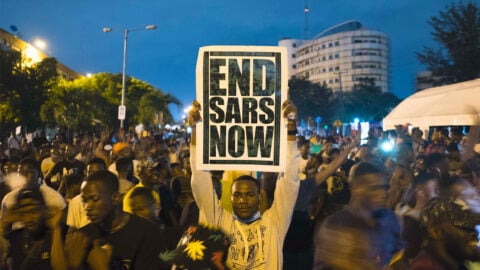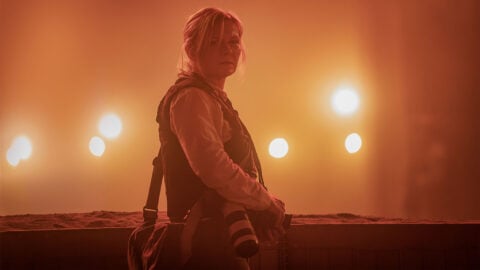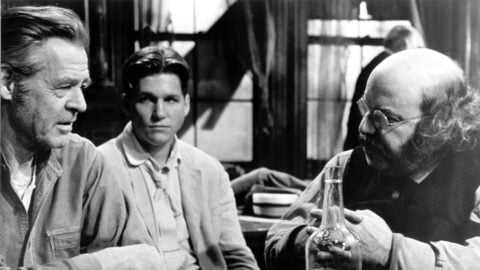Kaiju Shakedown: Kuei Chih-hung

Virgins of the Seven Seas
“Put frankly, Kuei was not a big-time director in the Shaw stable,” said screenwriter Szeto On in an interview about Kuei Chih-hung with the Hong Kong Film Archive. But while he was regarded as minor league during his time at Shaw Brothers, today he’s a giant, standing alongside Chang Cheh and Lau Kar-leung as one of the best directors the studio ever produced. A pissed-off perfectionist with proletarian sensibilities, he directed groundbreaking, realistic crime flicks and some of the filthiest horror movies ever to leave a slime trail across the silver screen. Kuei applied the technical chops of Lau Kar-leung to exploitation material. He had Chang Cheh’s obsession with violence, but he was willing to offend his audience in a way Chang wasn’t. The only Shaw director with a similar sensibility was barefooted Marxist hand-biter, Mou Tun-fei, but Kuei was better at navigating the system. For all of Mou’s fire, he turned in just five features for Shaw (and two shorts). Kuei delivered 33 features and four shorts over a 20-year career. And then he just walked away.
Kuei honed his technical skills to a razor’s edge during an abnormally long apprenticeship as an assistant director, working mostly with foreign auteurs like Shaw’s in-house Japanese trio of Ko Nakahira, Inoue Umetsugu, and Koji Shima, as well as the Italian director Bitto Albertini (Supermen Against the Orient, 73; Black Emanuelle, 75). Run Run Shaw even paired him with the Austrian Ernst Hofbauer to co-direct their pirate film Virgins of the Seven Seas (74), containing all the dwarf-tossing, kung fu spitting, mass rape, lesbianism, and torture you’d expect from a pirate film.
Although he’d directed six previous movies, they were mostly standard issue Shaw Brothers fantasy films and light comedies because Kuei, despite his combative reputation, was a good company man. The first generally acknowledged “real” Kuei Chih-hung flick was The Delinquent (73), co-directed with action maestro Chang Cheh (one of Shaw’s “major” directors, who says he merely lent his name to the flick to reassure the boss). The entire movie is one big punch to the audience’s face, opening with star Wang Chung running out of the darkness, smashing through paintings of Hong Kong, before screaming and shattering the movie’s frame with his fist. Wang plays an angry kid from the ghetto who tries to escape his crummy existence by joining a gang. He winds up getting his dad killed and taking a bunch of saws to the gut before murdering his boss in a posh high-rise apartment, then leaping out a window to his death.

The Delinquent
Kuei’s status as a “minor” director meant he had trouble booking studio time, so he filmed The Delinquent on location in some of the dirtiest parts of Hong Kong, a rarity for Shaw Brothers films. Cinematographer Yau Kei lashes these wild surroundings into a rabid frenzy with frantic zooms, grotesque wide-angle lenses, and bizarre compositions, framing action scenes through mountains of garbage with an extremely long lens. Yau and Kuei would go on to work together on approximately 14 movies over the next three years, which constitutes the first stage of Kuei’s career.
Next came the apocalyptically sleazy Bamboo House of Dolls (73), about an all-female World War Two Japanese internment camp that featured rampant racism, fellatio on a gun barrel, strap-on dildos, and more catfights per square inch than any five women-in-prison movies combined, but it was a relative breath of fresh air before Kuei’s grimy dive into the unforgettable Killer Snakes (74). Star Kam Kwok-leung (cast because he was the only actor who could handle snakes and remember his lines) plays a sexually humiliated loser who rediscovers his virility when he starts to murder the people he hates with his beloved poisonous snakes. Shot in another ghetto sweatbox, draped in piles of slimy snakes (trained by snake-handler Lam the Snake King) it’s a movie that leaves you dripping with fetid fluids: sour sweat, rancid spit, bright red Shaw Brothers blood, and yellow venom. But the movie that moved Kuei up the ladder at Shaw was The Teahouse (74) in which Chen Kuan-tai plays an immigrant teahouse owner who uses his restaurant as an extrajudicial courtroom, forging shaky truces between various tribes of Hong Kong’s unwashed underclass. Shot on location, with dialogue in Cantonese (rather than dubbed into Mandarin like most Shaw movies), it was a huge hit that spawned a sequel, Big Brother Cheng (75).
Kuei and Yau remade Straw Dogs, only with more motorcycles and spear guns, as Killers on Wheels (76), a movie featuring so many hardcore stunts that when a stunt rider was injured on camera, Kuei made him retake the shot before allowing him to go to the hospital. Kuei also became one of the prime movers in Shaw’s Criminals series (76-77), five anthology films based on real criminal cases that gave Shaw an outlet for failed feature projects, and allowed some of their most rabid directors to unleash their unhealthiest fixations. With segment titles like “Nude in a Box” and “Teenager’s Nightmare,” it was an unsavory series of films, and Kuei participated in more installments than any other director. His “Teenager’s Nightmare” about a serial rapist stalking public bathrooms doesn’t just feature a teenaged Kara Hui being told to “get your ass up” before being sodomized over a dirty toilet, it also features grotesque cinematography and humor so black you almost can’t see it anymore.

Killers on Wheels
Kuei’s great masterpiece, his only wuxia movie and biggest flop, Killer Constable (80), saw him exchange Yau for Lee San-yip, the cinematographer who’d stick with him for the rest of his career. Lee didn’t go for Yau’s hyperactive camerawork, instead exercising a smoother style that found its strength in his harshly geometric compositions, stylized lighting, and Lee’s uncanny ability to shoot coherent action in near-total darkness. All of these skills were on display in Killer Constable, which is a bleak, blasted monument to the entire wuxia genre.
Killer Constable starts with the Empress Dowager giving her security force 10 days to retrieve two million bucks in gold lifted from the royal treasury. The only man fit for the job is Constable Leng, whose motto is “Kill them all,” and whose bloody-minded pursuit of justice has even his own brother denouncing him. “You’re not a constable, you’re a murderer,” he spits. He ain’t wrong. Stabbing unarmed men in the back, torturing witnesses, callously killing informants who are no longer of any use, Leng’s investigation becomes more and more twisted until finally it eats itself. As Kuei said in an interview when his film was released: “I simply wanted to depict how insignificant commoners are.” Imagine an ancient Chinese version of Dirty Harry where Jeffrey Dahmer plays Eastwood’s character and you’ve got it about right.
“The more vulgar the movie, the more likely you will make money,” Kuei said in an early interview, and he was about to redefine vulgarity. Leaving behind the overheated social commentary of his earlier films [they really are socially concerned movies in the Hong Kong context – few directors were dealing with ghetto life, juvenile delinquents, triads, drug use, and real blue collar language and neighborhoods before Kuei, except for some outliers like Patrick Lung Kong], Kuei leapt into a giant pool of green pus for the second stage of his career. He’d already paddled around in this putrid puddle back with Spirit of the Raped (76), a movie that offers up family-sized servings of “Did I just see that?” moments with its tale of a woman having a very bad day: in a single afternoon she loses all her money, gets drugged, raped, sold into prostitution, given a venereal disease, and driven to suicide. Happily, she comes back from the dead to exact goopy revenge.

Spirit of the Raped
Spirit of the Raped was written by Szeto On, who claims that the next stage in Kuei’s career was all his fault. “I just thought that wacky, freaky stuff was right for him,” he said in an interview. First up was Hex (80) which was a rough remake of Clouzot’s Diabolique—with a naked dancing exorcism at the end. Then came the comedy sequel, Hex vs. Witchcraft (80), and Hex After Hex (82). The series was a hit, and while Kuei was still trying to insert social commentary, no one was having it anymore. (Hex After Hex originally had a criminal getting “1997”, the year Hong Kong was “returned” to China, branded on his butt; Kuei was forced to substitute it with a brand featuring the Shaw Brothers logo instead.) Cut off from his gadfly roots, Kuei would just have to make use of buckets of maggots and worms instead.
“Everyone in the business is giving all they can without reservation,” Kuei said in an interview. “In the past, they would hold back and save a few tricks for the next movie. Now it is an all-out game and you have to go for it.”
And he did. After Hex vs. Witchcraft, Kuei unleashed Bewitched, a movie about a cop investigating a black magician who murders children by driving nails into their skulls. Featuring lots of soft-focus shots of topless women running on beaches and making love, it stands out mostly for two gonzo black-magic duels between the evil wizard and a Buddhist monk, one of which includes the wizard powering up by guzzling down a pot of dead babies and rotten corpse parts. But these were just warm-ups for The Boxer’s Omen (83) a movie that will turn your hair white.

Boxer's Omen
There is a recognizable plot somewhere in Boxer’s Omen about a guy getting killed in Thailand while boxing and his brother’s search for revenge, but really it’s an excuse for some of the most lurid and surreal imagery ever put on film. A woman is sewn into the stomach of a dead crocodile. An army of animated alligator skulls march across a bleak hellscape before bats fly out of their eyes. A monk wraps himself in an enormous placenta. Whatever you think you’re prepared for, you’re not. Boxer’s Omen is the kind of movie that’s seared into your brain, but there’s always some stomach-churning marvel that ambushes you upon each new viewing. You remember the wizard puking up raw chicken guts and eating them, sure. But do you remember the wizards group-eating each other’s vomit? Or the flying alien sperm with glowing eyes and thrashing tail?
At the end of Boxer’s Omen, the main character puts on his street clothes, walks out of the monastery and abandons Buddhism without a backwards glance, and that’s essentially what Kuei did, too. In 1984, at 47 years old and at the height of his career, he walked away from Shaw Brothers and filmmaking. As Chua Lam, one of his longtime producers said: “He was disappointed with the whole film industry.” He moved to California and opened a pizza parlor. In 1999, he died of liver cancer. His son, Beaver Kuei, still works in the Chinese film industry and his most successful films are the rom-com Sophie’s Revenge (09) starring Zhang Ziyi, and The Painted Veil (06) starring Naomi Watts and Edward Norton. No one eats vomit in either film.
LINKS! LINKS! LINKS!
Cannes has revealed its lineup for this year, and there aren’t many surprises in its Asian entries:
Competition

The Assassin (Hou Hsiao-hsien) The best news in this year’s festival. HHH’s wuxia movie starring Shu Qi and Chang Chen, has been in pre-production (and raising its $15 million budget) since 2005. It’s been announced for Cannes before, only to disappear from the lineup, so one hopes that this time it’s for keeps.
Mountains May Depart (Jia Zhang-ke) A 2014 Cannes jury member and winner of 2013’s Best Screenplay award for A Touch of Sin, China’s most marketable art-house director turns in a three-part movie about a guy in love with a woman (Zhao Tao, as usual); he gets spurned by her, then reconnects years later, and winds up wandering off to find her son who’s working in an Australian casino. This will be the fifth movie by Jia to premiere at Cannes.
Our Little Sister (Hirokazu Kore-eda) The film adaptation of the manga Umimachi Diary, it’s about a 14-year-old girl who goes to live with her twenty-something half-sisters. This will be the fourth film by Kore-eda to premiere at Cannes.
UN CERTAIN REGARD

Madonna
Madonna (Shin Su-Won) One of Korea’s few female directors, Shin has made what’s described as a follow-up to her film Pluto (13), a harsh movie about schoolkids torturing each other over grades. In this go-round, a nurse’s aide tries to score a donor organ. A good time will assuredly be had by all.
Fly Away Solo (Neeraj Ghaywan) The first-time filmmaker already received $100,000 from the Sundance Institute for this film, which they describe with the following: “Four lives intersect along the Ganges river: a lower-caste boy in a hopeless love, a daughter torn with guilt, a father sinking in greed, and a spirited kid craving a family, all yearning to escape the constrictions of a small-town.” Global miserablism prevails!
Journey to the Shore (Kiyoshi Kurosawa) The great Tadanobu Asano (Ichi the Killer) and Eri Fukatsu (Bayside Shakedown) co-star in a film based on the novel by Kazumi Yumoto. Asano plays a husband who’s been missing for three years who suddenly reappears in his wife’s life. This will be the fifth movie by Kurosawa to premiere at Cannes, and he won the Jury prize at the 2008 festival for Tokyo Sonata.
The Shameless (Oh Seung-Uk) The director of Kilimanjaro (00), Oh turns in this mob drama starring Kim Nam-Gil (The Pirates) and Jeon Do-Yeon, who won Best Actress at Cannes for Secret Sunshine (07).
MIDNIGHT
Office (Hong Won-Chan) Not much is known about this serial-killer flick from Hong, who is the co-writer of ultra-grim Na Hong-Jin films The Chaser (08) and The Yellow Sea (10) and the fun ’n’ bouncy Confession of Murder (12).
In news that has nothing to do with Cannes…

… On April 1, Hong Kong’s government made the unprecedented decision to strip the world’s first Chinese television station and Hong Kong’s oldest broadcaster, ATV, of its license. The day before this was announced, ATV went on the air to claim that it had sold a 52 percent stake to up-and-coming television tycoon (and founder of Hong Kong TV) Ricky Wong. The next morning, Wong said: “What? Are you kidding? I never agreed to anything.” Once again, ATV looks like a bunch of boobs. Their broadcast license was immediately stripped, and they have a year before they go dark. Almost simultaneously, the Li Family, entrenched plutocrats, received a free-to-air license for their TV station, HKTVE. Ricky Wong, not a member of one of Hong Kong’s four big business families, is still being kicked to the curb by its government. His only hope for airtime now is his offer to sell four hours of his own programming per day to ATV between May and when they close the doors.
… Hey, look! Warner Bros Japan is using blackface to sell the new Will Smith movie!
… New Godzilla movies are coming, and they won’t star America’s “fat” Godzilla. Toho announced that the man behind the Neon Genesis Evangelion anime, Hideaki Anno, will be head director and scriptwriter. Backing him up as special-effects director will be Shinji Higuchi, who served in the same capacity on Shusuke Kaneko’s Gamera trilogy.







